UN Special Rapporteur Expresses Support For Iranian Hunger Striker

The UN special rapporteur on Iran has expressed solidarity with the Iranian hunger striker who has camped outside the British Foreign Office for 44 days.

The UN special rapporteur on Iran has expressed solidarity with the Iranian hunger striker who has camped outside the British Foreign Office for 44 days.
Javaid Rehman, the UN human rights rapporteur, Friday visited Vahid Beheshti who has been campaigning for the UK to proscribe the Islamic Revolutionary Guard Corps.
Beheshti has been battling the bitter winter outside the UK Foreign Office to raise awareness for the need to designate the IRGC responsible for the deaths of hundreds of Iranian citizens since September.
In his third letter on Monday the British prime minister, he reiterated his desire to meet PM Rishi Sunak, adding that “my body grows ever weaker, yet internally, I grow ever stronger in my conviction that this is the right thing to do.”
Beheshti called his request to the British government "simple and at the same time, very important" emphasizing the urgency of proscribing the IRGC.
He said the designation urgently needs to happen, not only for the people of Iran who yearn for democracy, but also for the people of Britain and "the values we uphold".
“As long as we continue with our appeasement policy, the IRGC will continue with their hostage taking policies,” he said. “They only understand one language, pressure and strong leadership.”
Beheshti has not eaten since February 23 and lost a large amount of his body mass. In the past days, a group of other Iranians also joined him and set up tents next to him.
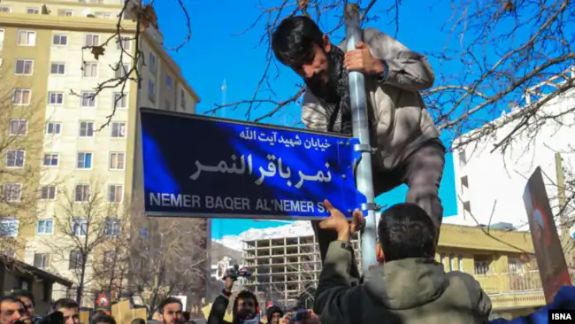
Reports say a street sign in Iran’s religious city of Mashhad that was named in honor of a Shia cleric executed in Saudi Arabia has been removed.
A journalist reported Saturday that there is no trace of the signpost of the street on which the vacant Saudi Consulate is located. The street was named in honor of Nimr Baqir al-Nimr, a Shia cleric and critic of Saudi government, who was beheaded in 2016.
The move came after a Saudi delegation arrived in Iran on Saturday to discuss the re-opening of embassies.
After his death, pro-regime crowds attacked Saudi Arabia's embassy in Tehran and also its consulate in Mashhad, throwing stones and Molotov cocktails, chanting "death to Al Saud". The move led to Riyadh severing diplomatic relations with Tehran for seven years.
However, it seems the name of "Ayatollah Nimr" has been pulled down following the agreement between Tehran and Riyadh concluded in Beijing in March to reopen embassies.
On January 2, 2016, Saudi Arabia’s Ministry of Interior announced in an official statement that Sheikh Nimr Baqir al-Nimr was executed along with 46 other people for terrorism charges and his connection with terrorist groups, mainly Al-Qaeda.
Nimr, who was one of the leaders of the Shiite protests in Saudi Arabia in 2011, had studied in Iran’s religious city of Qom.
Supreme Leader Ali Khamenei called the execution of Nimr "a political mistake and a great sin".
Following his comments, the Mashhad city council approved a plan to name a street in honor of Sheikh Nimr.
Tehran City Council also named a street in District 1 "Sheikh Nimr Baqir al-Nimr" in September 2016.
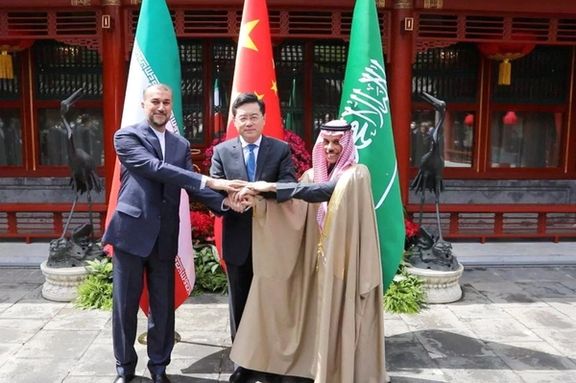
Iran’s government-controlled media is speculating about the direct economic benefits of restoring relations with Saudi Arabia, amid a deep economic crisis.
Although it is not clear how far the Saudis are willing to go in developing ties with Iran, the hard-pressed government in Tehran is encouraging expectations of a big windfall.
The government’s official news website IRNA Saturday carried a lead article titled, “Expansion of trade relations with Saudi Arabia, an important leap for Iran’s economy.” There were also similar opinions in other websites.
IRNA’s article carried no concrete information about when and how economic relations will expand with Riyadh, while Tehran is under US sanctions. IRNA, in fact, presented a wish-list.
Meanwhile, Saudi officials arrived in Iran to discuss procedures for reopening Riyadh's embassy in Tehran and consulate in Mashhad, the Saudi foreign ministry said on Saturday.
The only concrete hope Tehran can have is easing financial and commercial restrictions by the United Arab Emirates, close ally of Saudi Arabia, for potential Iranian attempts to circumvent US banking sanctions. Washington will be certainly watching the situation, but any Saudi acquiescence in helping Tehran indirectly break sanctions could be a blow to the United States pressure policy on the Islamic Republic.
CIA Director William Burns visited Saudi Arabia this week to reaffirm intelligence cooperation, a US official said on Thursday, as the kingdom on the same day Iranian and Saudi top diplomats met in Beijing to start the process of re-establishing diplomatic ties.
China's role in arranging the deal was seen by some experts as signaling a decrease in US influence with Saudi Arabia amid tensions between Washington and Riyadh over a number of issues, including human rights and Saudi oil production cuts.
"Director Burns traveled to Saudi Arabia, where he met with intelligence counterparts and country leaders on issues of shared interests," the U.S. official said on condition of anonymity.
If not on the economic front, the Saudi-Iranian rapprochement is already giving diplomatic and security dividends, at least in reducing tensions in Yemen.
Saudi and Omani envoys are planning to visit Yemen's capital Sanaa next week to negotiate a permanent ceasefire deal with Iran-aligned Houthi officials, according to Reuters, and end an eight-year-old conflict there, two people involved in the talks said.
Oman, which shares borders with Yemen and good relations with both Riyadh and Tehran, has been trying for years to bridge differences between Yemen's warring parties, and more broadly between Iran and Saudi Arabia and the United States. A permanent ceasefire in Yemen would mark a milestone in stabilizing the Middle East.
If an agreement is reached, the parties could announce it before Islam's Eid holiday starting April 20, the sources said.
Right before news of a possible peace visit to Sanaa by Saudi and Omani representatives, the Saudi led military coalition lifted eight-year-old restrictions on imports headed for Yemen's southern ports, the internationally recognized authorities said, in a sign that peace talks are progressing with the Houthi group in the north.
This follows the easing of restrictions in February on commercial goods entering the Houthi-held western port of Hodeidah, the country's main seaport, as Yemen's warring sides work to reinstate an expired UN-brokered truce deal.
The Saudi-backed government based in the south said in a statement late on Thursday that commercial ships would be allowed to dock directly in southern ports, including Aden, and all goods would be cleared, with some exceptions.
Abu Bakr Adeed, deputy head of Yemen's Chambers of Commerce, told Reuters ships would not have to stop at the Saudi Red Sea port of Jeddah for security checks for the first time since the Saudi-led coalition intervened in Yemen in 2015.
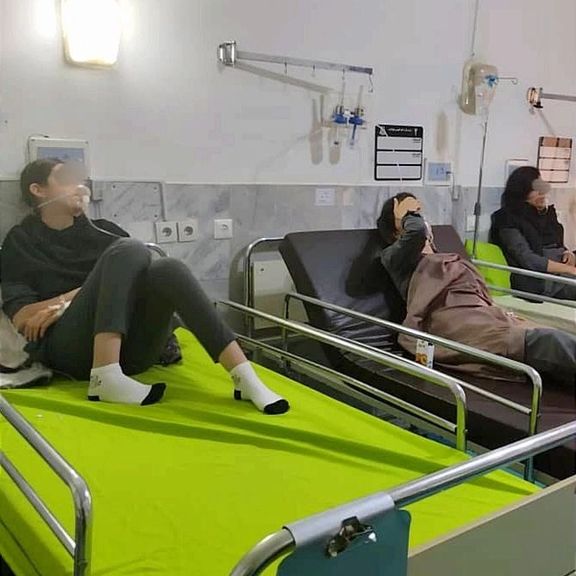
Human Right organizations report that suspected gas poisoning in Iran’s schools continued on Saturday with with 12 schools targeted and several schoolgirls hospitalized.
The Twitter account of Hengaw, which is an Independent rights monitoring group following violations in Iran’s Kurdish regions, reported that two schools in the city of Naqadeh were attacked on Saturday.
Meanwhile, The Coordination Council of Iranian Teachers' Trade Associations reported a school in the city of Ardabil in the northwest was also attacked and a number of students were poisoned.
There are also reports of an attack with suspected poisonous gas on a school in Haftkal city of southern Khuzestan province. At least 20 students with symptoms of gas poisoning have been admitted to the hospitals of the city.
At least 130 elementary and high schools were targeted in the past Iranian year ending in March 20.
The attacks that started in November have continued without any apparent effort by the government to seriously pursue the perpetrators or explain to terrified parents and students what was happening in so many schools.
Many ordinary Iranians have been suspicious of involvement of the regime itself, or religious extremists protected by the regime, calling the attacks “state terrorism”.
The government has aired ‘confessions’ of those allegedly responsible for the attacks as a man and his daughter forced to speak to national TV. The broadcast has all the trademarks of the regime’s forced confessions.
Local media has been asking the government about its total silence on any ongoing investigation.
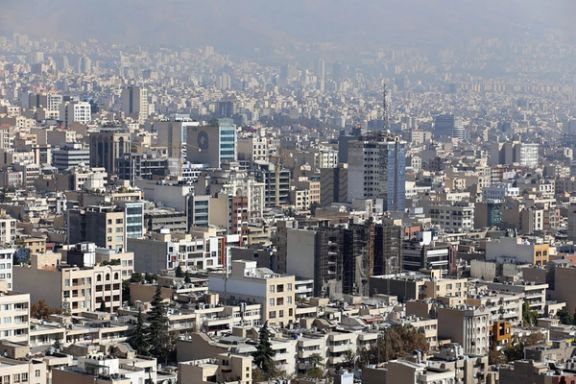
An economic daily says housing prices and rents in Tehran have jumped in the past three months by at least "40% compared to the previous quarter.
Donyaye Eghtesad (World of Economy) said in a report on Saturday that in the first weeks of Iranian new year (starting March 21), the number of newly built units offered for sale increased slightly, but the housing market transactions did not return to normal.
The daily also added that "the proposed prices are much higher than the expectation of the buyers".
Meanwhile, Jam-e Jam daily, which is owned by Iran's state broadcaster, reported that "the government has lost the ability to monitor the chaotic housing market."
"In less than two and a half months, the relocation of tenants will reach its peak, but the plans of the government and parliament to control the rental market have failed, with many tenants more worried about the unreasonable increase in prices," stressed Jam-e Jam.
In the meantime, Saeed Lotfi, a member of the board of directors of the Tehran Real Estate Consultants Union noted that “the government presents plans that are not based on expertise.”
Rents and home prices have climbed as much as inflation and the value of the US dollar have risen in recent months, reaching a level that an ordinary worker must hold two or even three jobs just to afford basic housing. Workers make between $100-150 a month, calculated by the current rate of the dollar which is 510,000 rials.
Food prices have increased between 70-100 percent in the past 12 months on top of high inflation in the previous year.
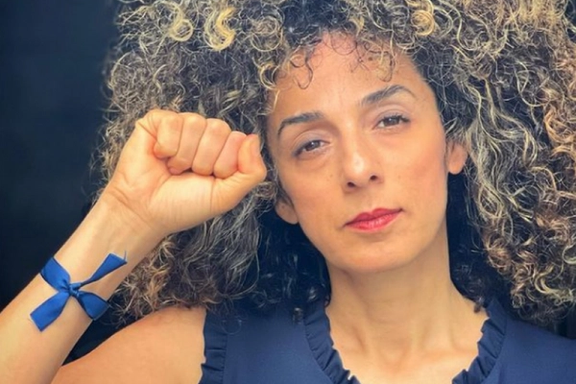
A federal court in New York has sentenced Niloufar Bahadorifar, an Iranian-American woman, who had pleaded guilty in a plot to kidnap opposition figure Masih Alinejad, to four years in prison.
Bahadorifar, had also confessed to conspiring to break US economic sanctions on the Islamic Republic by helping to provide money to a private investigator, who was tasked with monitoring Alinejad.
During the court session on Friday, Bahadorifar apologized to Alinejad calling her “a hero to all Iranians.” However, according to Alinejad, the judge realized the defendant was trying to abuse all Iranian women to show herself as a "victim of the Islamic Republic and the patriarchal system".
“Niloufar Bahadorifar willfully violated sanctions and knowingly provided financial support to Iranian intelligence assets, who in turn were engaged in a plot to kidnap an Iranian human rights activist living in the United States whom the Iranian government has sought to silence for years,” said US Attorney Damian Williams.
Alinejad, who campaigns against mandatory hijab and other rights issues was the target of an international kidnapping plot orchestrated by Iran’s intelligence network in 2021. She has a considerable following in Iran especially among women with 8.8 million followers on Instagram and 721,000 on Twitter.
US authorities charged an Iranian intelligence agent and some others with attempting to abduct Alinejad and take her back to Iran, but the regime in Tehran denies the charge and the four defendants, who all reside in Iran, have never stood trial.